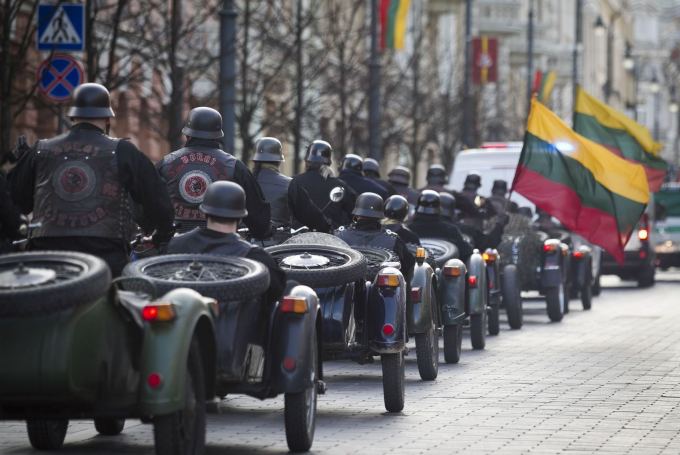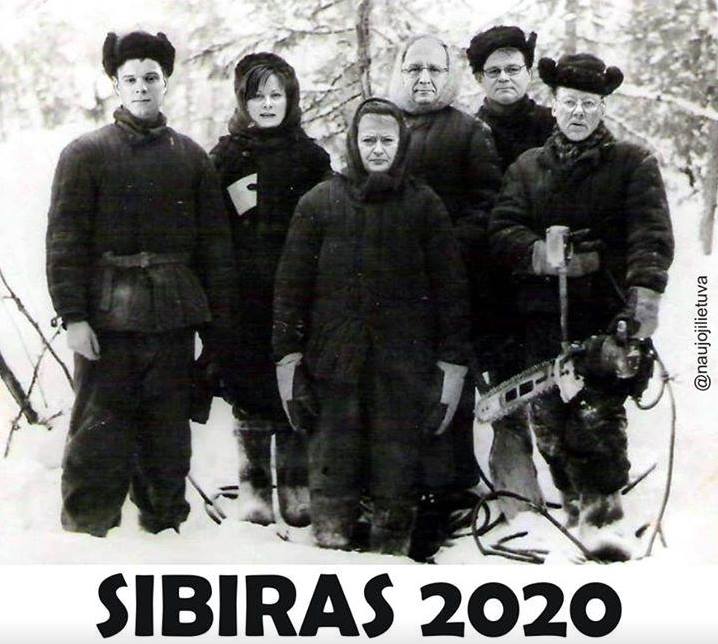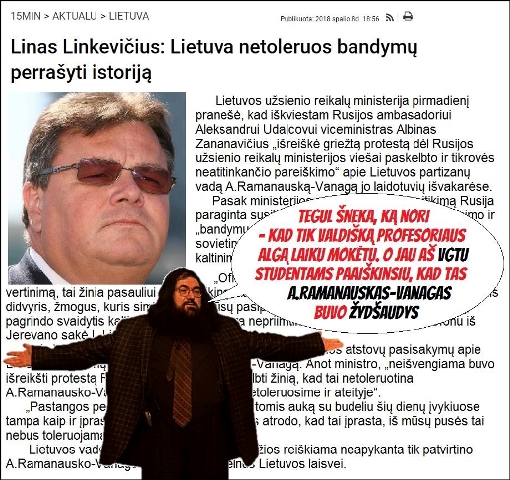
Views: 1634
Lithuania’s Foreign Minister Linas Linkevicius is no ordinary diplomat. He is more a diplomatic hitman whose ideological mission is to blow holes in European-Russian relations at every opportunity.

One of his recent “jobs” was to write an op-ed for the Irish Times in which he castigated the European Union for appeasing Russian President Vladimir Putin. Linkevicius used a hoary old historical analogy comparing the EU with British leader Neville Chamberlain and his appeasement in 1938 of Nazi Germany’s Hitler.
Apart from the ignorant historical waffling, the other curious thing about Linkevicius’ op-ed piece in Ireland’s so-called “paper of record” was the timing. It was published on December 17, three days before EU foreign policy officials were to meet in Brussels on the issue of extending sanctions against Russia.
As it turned out, the EU agreed to extend sanctions on Moscow by another six months until July 31, 2019, when the matter will come up for review again.
For the past four years, the EU has imposed sanctions on Russia in line with Washington over pejorative claims that Moscow “annexed” Crimea. This claim is made in spite of the fact that the Crimean people voted in a referendum to secede from Ukraine, which had been taken over by a NATO/EU-backed Neo-Nazi coup, and to join the Russian Federation.
EU sanctions have been rolled over every six months for the past four years, each time given impetus by some new dubious issue, such as the shooting down of the Malaysian airliner over Ukraine in July 2014 or the alleged poisoning of former Russian spy Sergei Skripal in England in March 2018.
Typical of the Baltic states and their rightwing governments, Linkevicius’ world view is dominated by an abiding Russophobia.

Before becoming Lithuania’s foreign minister in 2012, he was the country’s permanent representative to the NATO military alliance. The 58-year-old politician’s top concern is to ensure that European states never normalize relations with Russia. He is frequently quoted in Western media or writes op-ed pieces in which he lambasts European calls or inclinations for re-engagement with Moscow.
His recent diatribe in the Irish Times was thus his usual run-of-the-mill Russophobia. Given Lithuania’s appalling history of collaborating with Nazi Germany, it surely is twisted irony for Linkevicius to level duff analogies about Russia.
However, the poison pen of Linkevicius is not just a simple matter of one politician airing his warped view of the world. Linkevicius and his rightwing anti-Russian ilk are appointing themselves as the arbiters of relations between the entire 28-member EU bloc and Russia. In other words, a minority of ideologues who view everything through a prism of Russophobia are trying to dictate to the rest of Europe on how to conduct relations with its biggest and, arguably, most strategically important neighbor, Russia. And that dictated conduct is to be unrelentingly hostile. How democratic of Linkevicius.
The Republic of Ireland, like several other EU members, has counted the cost of sanctions on Russia dearly. Between 2014 and 2016, Irish exports to Russia were slashed by half, from €722 to €364 million. The loss was due to Moscow enacting counter-sanctions on EU countries which badly hit Irish agricultural exports of beef, pork and dairy.
As with other EU economies, the Irish have been rueing the whole sanctions war with Moscow. Last year, a senior Irish government delegation travelled to Russia in a bid to “reset relations”. As the Irish Times reported: “Trade the target as Ireland seeks a reset in relations with Russia.”
More recent data shows that trade relations between the Irish republic and Russia have recovered hugely from the low-point in 2016. Total bilateral trade had risen by 40 per cent to €800 million for the year ending 2017, which is almost back to the level it was before the Ukraine conflict started. (Ireland’s bilateral trade with Lithuania is estimated to be about half that with Russia.)
There are plenty of indicators that the Irish economy is still struggling from the 2008 global financial crash. Ireland’s rural economy is particularly hurting with harrowing cases of farmers going bust and having their dwellings repossessed due to debt arrears.
As with many other EU countries, the Irish economy and society can’t afford the continuing futile new Cold War with Russia. The premises for the conflict are entirely bogus but the damage is entirely palpable for many ordinary people from loss of jobs and business.
The crucial thing about the EU sanctions policy on Russia is that it requires unanimity among the 28 member states for the measures to be extended.
If, say Ireland, were to have voted against the renewal of sanctions at the last December 21 European Council meeting, then the EU would be have to revoke its policy against Russia.
Given the background trends in the Irish economy and the behind-the-scenes moves by Irish officials to restore trade relations with Moscow, it can be fairly speculated that the Lithuanian foreign minister spotted a possible “weak link” in the EU chain of sanctions.
Linkevicius’ article in the Irish Times on December 17 was a diplomatic hit job, knowing that the paper is widely read by Irish representatives in the Brussels administration.
There was no news value in Linkevicius’ op-ed piece. It was a pointed sabotage against any notion of normalizing trade ties between the EU and Russia. Historical appeals about appeasing Nazi Germany were grotesque falsification of current events, and a blatant bid at moral blackmailing. The article was headlined: “How many wake up calls about Putin do we need?” More to the point, the Irish Times should publish an article with headline: “How many wake up calls about Russophobia do we need?’
Here’s a prediction. Next time the EU meets to decide on extending sanctions against Russia on July 31, you can bet Linkevicius will dust off another poison pen piece to some paper in a European capital considered to be going soft (that is, coming to its senses) on ending sanctions.

Originally published on 2018-01-13
About the author: Finian Cunningham is a former editor and writer for major news media organizations. He has written extensively on international affairs, with articles published in several languages.
Source: Strategic Culture Foundation
Origins of images: Facebook, Twitter, Wikimedia, Wikipedia, Flickr, Google, Imageinjection & Pinterest.
Read our Disclaimer/Legal Statement!
Donate to Support Us
We would like to ask you to consider a small donation to help our team keep working. We accept no advertising and rely only on you, our readers, to keep us digging the truth on history, global politics and international relations.








